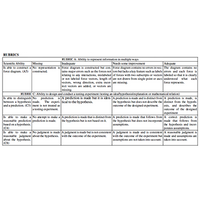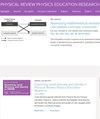比较学生在仪器实验和视频实验中科学能力的学习和发展
IF 3.6
2区 教育学
Q1 EDUCATION & EDUCATIONAL RESEARCH
Physical Review Physics Education Research
Pub Date : 2023-11-16
DOI:10.1103/physrevphyseducres.19.020158
引用次数: 0
摘要
本文是《教学实验室:改进传统与新方向》集中文集的一部分。在本文中,我们描述了一个研究项目的结果,该项目的目标是:(1)使用研究性科学学习环境(ISLE)方法开发和实施基于视频的实验调查;(2)研究参与视频实验的学生与使用物理设备进行相同调查的学生相比,如何发展科学能力和学习物理思想。我们开发了六个并行的基于孤岛的调查,供学生参与,使用仪器或在Pivot平台上创建的视频阵列。我们发现,以视频为基础的活动代替30%的基于设备的活动并不影响学生概念物理知识的发展。另一方面,学生是否使用物理设备进行实验或使用视频实验对某些科学能力的发展有显著影响。本文章由计算机程序翻译,如有差异,请以英文原文为准。

Comparing students’ learning and development of scientific abilities with apparatus-based versus video-based experimentation
[This paper is part of the Focused Collection on Instructional labs: Improving traditions and new directions.] In this paper, we describe the results of a research project whose goals were to (1) develop and implement video-based experimental investigations using the Investigative Science Learning Environment (ISLE) approach and (2) study how students who engage with video experiments develop scientific abilities and learn physics ideas in comparison to students who do the same investigations using physical apparatus. We developed six parallel ISLE-based investigations for the students to engage in, either with apparatus or with video arrays created in the Pivot platform. We found that substituting 30% of the apparatus-based activities with video-based activities did not affect student development of conceptual physics knowledge. On the other hand, the development of certain scientific abilities was significantly affected by whether students experimented with physical apparatus or used video experiments.
求助全文
通过发布文献求助,成功后即可免费获取论文全文。
去求助
来源期刊

Physical Review Physics Education Research
Social Sciences-Education
CiteScore
5.70
自引率
41.90%
发文量
84
审稿时长
32 weeks
期刊介绍:
PRPER covers all educational levels, from elementary through graduate education. All topics in experimental and theoretical physics education research are accepted, including, but not limited to:
Educational policy
Instructional strategies, and materials development
Research methodology
Epistemology, attitudes, and beliefs
Learning environment
Scientific reasoning and problem solving
Diversity and inclusion
Learning theory
Student participation
Faculty and teacher professional development
 求助内容:
求助内容: 应助结果提醒方式:
应助结果提醒方式:


